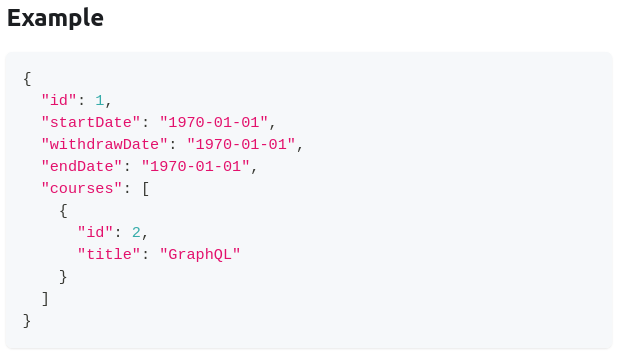Examples
By enabling the option printTypeOptions.exampleSection, you can add examples to types documentation.
Usage
1. Add a type definition directive @example to the schema
directive @example(
value: String
) on OBJECT | INPUT_OBJECT | INTERFACE | FIELD_DEFINITION | ARGUMENT_DEFINITION | SCALAR
2. Add examples to the schema
scalar Date @example(value: "1970-01-01")
interface Record {
id: ID! @example(value: "1")
}
type Course implements Record @example(value: "{ \"id\": 2, \"title\": \"GraphQL\" }") {
id: ID!
title: String!
}
type Semester implements Record {
id: ID!
startDate: Date
withdrawDate: Date @deprecated
endDate: Date
courses: [Course!]!
}
type Query {
course(id: ID!): Course @example(value: "{ course(id: \"1\") { title } }")
}
Examples can be inherited, this is why in the above example there is no example explicitly set for the type Semester, and it will render as the following

Advanced options
Example directive definition and parser behavior can be customized through the configuration using a TypeDirectiveExample object instead of a boolean value for printTypeOptions.exampleSection:
interface TypeExampleSectionOption {
directive?: string; // customize the directive name
field?: string; // customize the directive's field name
parser?: (value?: unknown, type?: unknown) => unknown; // customize the field's value parsing
}
For example, if the GraphQL schema already supports examples using the @spectaql directive.
type CustomExampleDirective {
myField: String @spectaql(options: [{ key: "undocumented", value: "true" }])
myFieldOtherField: String @spectaql(options: [{ key: "example", value: "An Example from the Directive" }])
myFieldOtherOtherField: String @spectaql(options: [{ key: "examples", value: "[\"Example 1 from the Directive\", \"Example 2 from the Directive\"]" }])
}
docusaurus.config.js
plugins: [
[
"@graphql-markdown/docusaurus",
/** @type {import('@graphql-markdown/types').ConfigOptions} */
{
// ... other options
printTypeOptions: {
exampleSection: {
directive: "spectaql",
field: "options",
/* simplified parser for @spectaql (non production ready) */
parser: (options, type) => {
if (!options) {
return undefined;
}
const example = options.find(
(option) => {
return ["example", "examples"].includes(option.key);
},
);
if (!example) {
return undefined;
}
if (example.key === "example") {
return example.value;
}
return JSON.parse(example.value)[0];
}
}
}
}
]
]